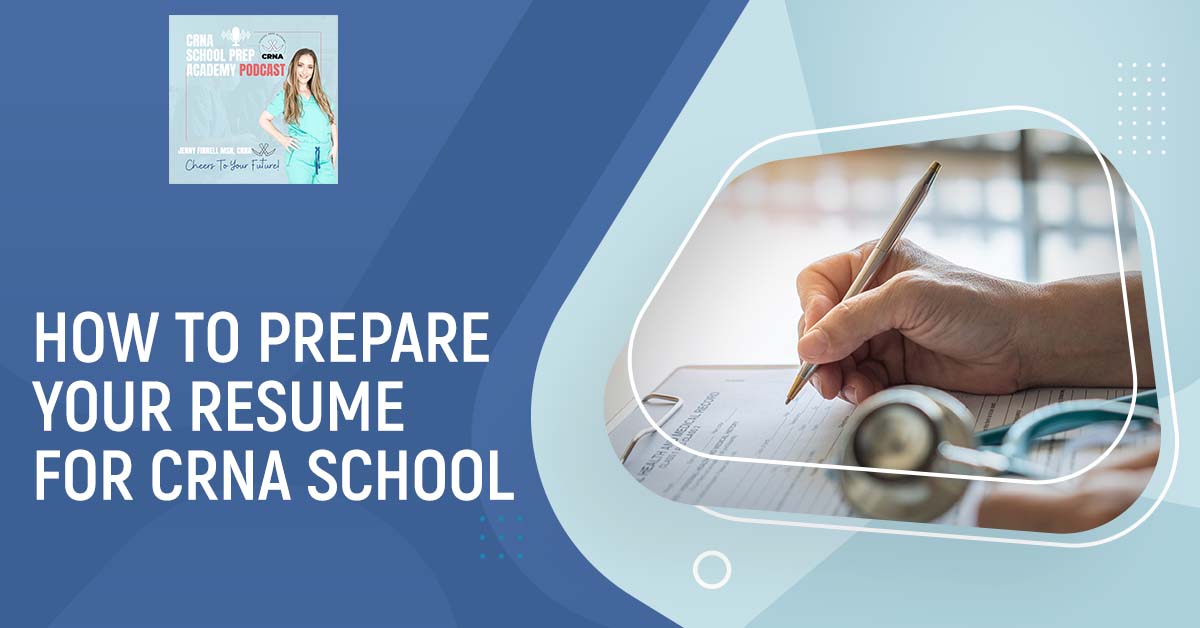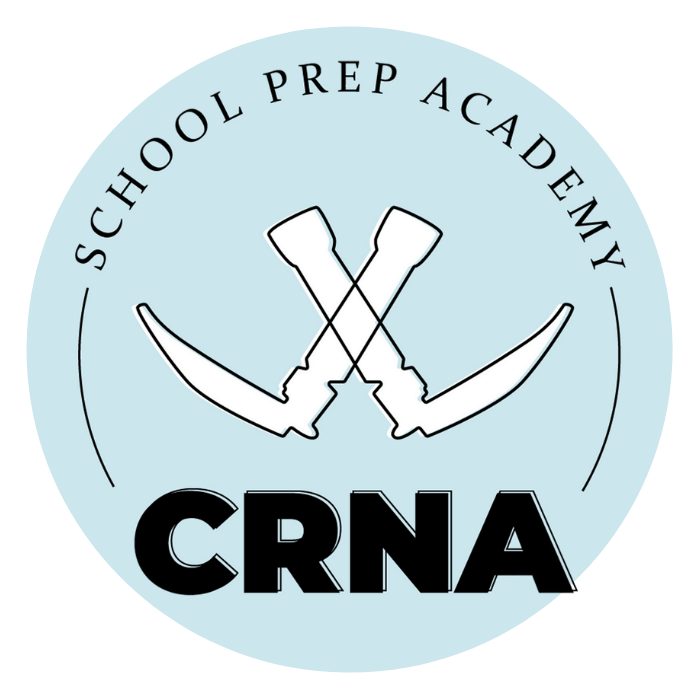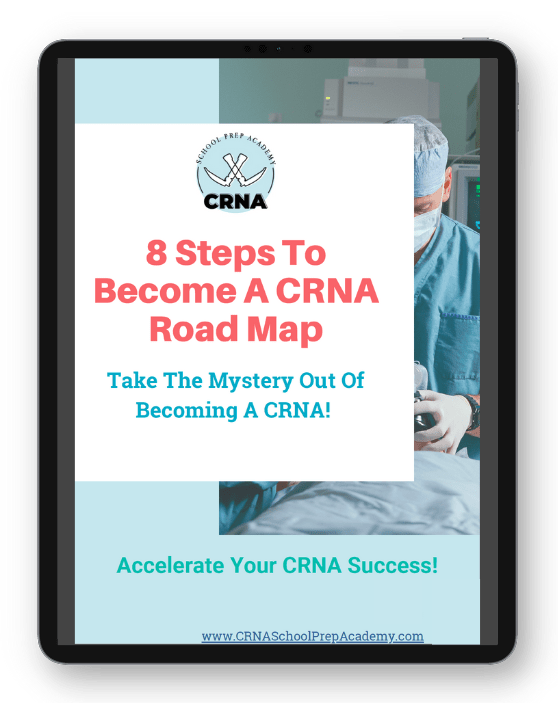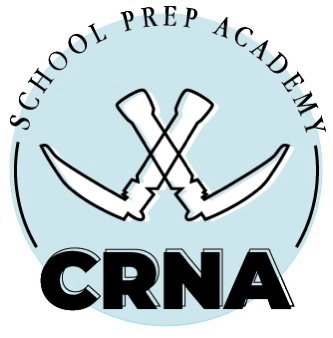
Your resume is the ticket to your dream CRNA School. That is why you must put effort into your CRNA school resume. However, with so many applicants, how can you catch the attention of your school and stand out? In this episode, Jenny Finnell shares some advice on preparing your resume for when you want to make a good impression on your future CRNA school. She breaks down the dos and don’ts of writing your application, as well as the tools you can use to make it spotless. What should be front and center? How long should your CRNA school resume be? What do you do to stand out? Jenny answers these questions and more in today’s show.
Get access to planning tools, valuable CRNA Faculty guidance & mapped out courses that have been proven to accelerate your CRNA success! Become a member of CRNA School Prep Academy here:
https://www.crnaschoolprepacademy.com/join
Book a mock interview, personal statement critique, resume review and more at https://www.TeachRN.com
Join the CSPA email list: https://www.cspaedu.com/podcast-email
Send Jenny an email or make a podcast request!
Hello@CRNASchoolPrepAcademy.com
—
Watch the episode here
Listen to the podcast here
How To Prepare Your Resume For CRNA School
In this episode, we’re going to discuss preparing your CRNA school resume. I’m going to cover some of the things that you should not be doing as well as some things you could be doing to make sure you make a good impression. Let’s go ahead and get into the show.
—
Put A Lot Of Effort Into Your CRNA School Resume
We’re going to discuss preparing your resume for CRNA school and some of the things that you should avoid as well as some things that you should be thinking about, little nuances so that you’re making a good impression. First and foremost, I want to make sure that when you guys start doing your CRNA school resume, you are not treating this process like checking a box. They will be able to tell if that is the case. It will essentially make it look like you are not putting a full amount of effort into it or that maybe you’re not the most serious applicant.
Make sure that when you work on your resume that you’re putting a lot of effort and time into making sure that it’s easy to read. It flows nicely. It’s well organized and you have a hundred million times triple-checked the spelling. I use Grammarly. There’s a free version of it. Just copy, paste, and stick it in Grammarly real quick because if you’re like me, I make typos without even realizing that I made them. I will reread something five times and I’m like, “How did I not see that?”
I use Grammarly a lot for that reason. Sometimes it’s hard to proofread your own stuff because your brain is plugging in words that aren’t there or it’s correcting the mistake because that’s what you meant to say, but you didn’t type it out that way. Make sure you have someone else lay eyes on your resume, too. Have your coworker, your friend, your mom, dad, or whomever. You can also do a resume review with CRNA School Prep Academy’s expert providers, that’s always an option as well.
Make sure that you’re putting a lot of effort into your CRNA school resume because, if you think about an invitation to a wedding or getting an invitation to anything for that matter, it’s your first impression. We always say, “Don’t judge a book by its cover,” but the reality is people do and will judge you based on your resume. That’s their first impression of you. They don’t know you or your personality. There’s something to be said with physically hearing someone speak, listening to the tone of voice and seeing their eye contact.
All of those things go into how you display yourself, where a piece of paper can’t usually do you justice. You have to go above and beyond to make sure when someone’s reading a piece of paper, if they’re in a bad mood or had a bad experience and go into reading your resume, that you’re going to make them smile somehow. They’re not going to know you. They are not going to hear a tone of voice or anything like that.
Place Your Educational Background Front And Center
Going into mistakes people make when they do the resume is they want to highlight their clinical experience. They tend to do this in place of their education. That is a mistake. If you think about it, you’re applying to grad school. You’re not applying for a job. If you took your old template from when you were applying to your ICU position, maybe it mattered more about your work experience as a nurse’s aide because you’re applying to a work position. You’re applying to work as a nurse versus applying to school.
Your educational background should be front and center. The other reason why you should put your education at the top of your resume versus going right into your clinical experience is that it’s going to be a shorter section. It’s going to be more concise to the point. If you were to put that at the end of your resume, they have to read through all your clinical stuff to find your education. By the time they get there, they may skim over it real quick and you’re going to get to highlight your accomplishments as well; you don’t want them skimming that.
We always say, 'Don't judge a book by its cover,' but the reality is people do and will judge you based on your resume. Click To TweetRemember, you’re applying for a grad school position. Highlight your educational background. Where did you get the degree? What is the name of your school? When did you graduate? It’s not just the year. Some people make this mistake when they put, “I graduated in 2020. Did you graduate in May of 2020 or December of 2020?” Because this can say, “They graduated in May of 2020, so they have six more months of experience versus someone who graduated in December of 2020.” Differentiate yourself and make it known like, “I graduated in January of 2020, so I had the entire year of 2020 to get experience under my belt.”
How well did you do? I get asked this question a lot as far as, “Should you be placing your GPA on your resume?” The answer can go both ways. I do think if you have a 3.5 or higher, you should be highlighting that on your resume. At the end of the day, they are going to be reviewing your transcripts and calculating your GPA regardless. If you don’t do this step, it’s perfectly okay. If you’re a B-plus student on average and you have a 3.5, you should highlight that. Why not? It’s going to take up very little room and you might as well highlight it.
If you have someone who has maybe a 3.0 or a 3.2, this could be something that is better left off the resume. Again, they’re going to be calculating your GPA with your transcripts anyways but it gives you a space to highlight other things. Maybe you were given an award or maybe you served on a committee in nursing school. Make sure that you’re using your resume to highlight your strengths. That’s always what your resume is all about. That explains as far as highlighting your GPA and things like that.
Some of you are taking different routes to becoming a nurse. Some of you have gotten your ADN and BSN. Some of you have a Bachelor’s in Biology and you get an accelerated BSN. Depending on what you do, make sure you put your most current schooling up top. If you had your ADN and got your BSN, your BSN should be at the top of the page versus the other way around. You should always go with the most current ICU experience, education experience, and degree at the top, and list the older experience below that.
Also, another tip is to spell out your degrees. Put Bachelor’s Degree in Biology versus BS in Biology. That’s a nuance that Mr. Richard Wilson pointed out to me. As a faculty member, he appreciates seeing things spelled out. It doesn’t take up a lot of room on your resume, plus it sounds and looks better. We discussed GPA. It’s the same thing. If you had cum laude and things like that, you could put that on your resume.
Another piece of advice given by Dr. Dawn AuBuchon, who has been a Program Director for several years and is now a Program Faculty at a CRNA college: A lot of you are taking courses and you’re like, “Should I list individual courses? I didn’t get a degree at this college, but I took individual courses there.” You don’t need to list individual courses if it’s going to reflect on your transcripts. If you’re currently in a course and it’s not going to reflect on your transcripts because when you submitted your transcripts, the course hasn’t finished, you can and should highlight the course you’re in.
What these program faculty and I have recommended is for you to approach your professor, wherever you’re at in the course, and ask them for a short letter that they can sign that says, “Such and such is in X, Y, and Z course is such and such into the semester. I anticipate them getting an X grade in the course.” Have them anticipate what they think your final grade will be as long as you keep performing as you have been performing in the course. It’s like an unofficial way of them saying, “I anticipate the student to achieve an A-minus, an A, or a B-plus, whatever it may be.”

It shows these schools that you are taking something additional, so they don’t miss it. After you have completed the course, you could submit that course to go into your overall GPA as long as they’re able to take things after the deadline. This is something that you can reach out to the program and let them know, “Is it possible for me to submit this course after I take it even though the deadline for applications is X date? Two weeks later, I’m going to have my final grade. I can submit an anticipated grade. Once this course is complete and it reflects on my transcripts, I can submit that.”
A lot of schools will take that into consideration. It is something to think about. Don’t think you have to list all these individual courses you’ve done at different schools, as long as it reflects on your transcripts. I’ve heard this argued in both ways. Make sure that your transcripts are solid. Review your transcripts. Don’t submit them and not look at them. I’ve had students that have happened where they think they take their transcripts from a school and submit it. They come to find afterward they didn’t submit all their transcripts as they thought they did.
Make sure you are laying eyeballs on your transcripts, especially if you’re submitting from multiple schools. You don’t want something to get missed. You can list things like honors, societies, rewards, and committees. You don’t have to put what you did, but list the fact that you have received rewards or you have served on the Student Nurse Association for your college. You can list that stuff there, along the lines of cum laude, Magna cum laude, and things like that in that area. It should be front and center because you’re applying to grad school.
CRNA School Resume Length And Format
The next big question that people always ask me is, “Jenny, how long should a resume be? What’s the difference between a resume and a CV, a Curriculum Vitae?” The short answer is they are using these terms interchangeably, so there’s not much difference in the way you’re going to be using a resume versus a CV. If you want to know the technical difference, the CV is more used for someone’s going to get a PhD, for example, and they have all this research they want to highlight in their resume. They could be 10, 20, or 30 pages long.
A CV doesn’t have a length requirement. It can be as long as you need it to be versus a resume which is designed to be more of a short one-page summary of your experience. That’s the technical difference. Schools will use this term interchangeably. If they say CV, it doesn’t mean they want a book from you. Based on the faculty that I spoke to, most of them have recommended trying your best to keep your CV or resume to two pages max. You also got to keep in mind that these schools sometimes are getting 150 to 200 applicants for 30 positions. The program faculty are going to be scanning over 100 resumes.
Sometimes, they have to get through it and the longer you make your resume, they may start to skim towards the end. They may focus on that first page and look at the second one, but by the time they get to the third page, they’re like, “This is more of the same stuff. I’ll move on right to the next applicant.” Keep in mind that the things that you put on pages 2 and 3 may not get the attention. Make sure that if you’re making your resume that long, the things you’re putting on the last page are not things you really want them to see because they may not mentally capture it at that point. That’s the rundown on CV versus resume, page lengths, and stuff like that.
The most important tip I have as far as building out your resume this way is to make sure you’re keeping it formatted universally. Make sure you’re using the same font and text size. If you’re going to put a date like, for example, March 2020 and you use the numbers and a dash, on the next section, don’t put March and spell it out with 2022. If you’re going to use numbers, use numbers. If you’re going to spell it out, spell it out throughout your resume. Keep your formatting universal and standard. It doesn’t matter which one you choose, but make sure it’s not going to be different per bullet point.
Make sure that you're using your resume to highlight your strengths. Click To TweetIt’s going to seem sloppy even though it might not be intended to be that way. It will potentially come across as less professional. Make sure that your formatting is not that when you skip over to the next space, it’s indented differently as far as where it lines up. Resumes can be tricky. I don’t know how many times I’ve said bad words to my computer when I’m like, “Why is this doing this?” The format is all messed up. I highly recommend using a template.
If you have Canva, use that. You can have a free Canva account. I have a paid account because I use it every day, but there are so many templates in Canva. CRNA School Prep Academy has templates as well. We even have examples of resumes for you to follow. Use a template. Don’t stress yourself out. Keep it basic. If you’re on Canva, there are all kinds of crazy resumes. You don’t need anything bright and elaborate. Keep it neutral. You don’t need anything crazy and putting a picture, yay or nay. As long as it’s not overwhelmingly huge on the page, I don’t think it’s a terrible thing, but I also think it detracts from the overall purpose of the resume.
When you’re applying for a job, I don’t think that’s a bad thing. Applying for a job, and having a little picture of yourself, especially if it’s a professional shot, is nice. For grad school, I don’t know how necessary it is. If it takes up enough space to where you have less highlighting for you to do as far as your experience and what you’re coming with, you should avoid it, in my personal opinion.
It’s not going to matter to them. They want straight to the point. In applying for a job, you’re not taking 200 applicants for 30 positions or whatever that end up working out. Maybe you are. I don’t know. For grad school, keep it simple. It’s the KISS method, Keep It Simple, Stupid. Because sometimes the more you try to embellish and elaborate, the more difficult something becomes. That’s the same thing with a resume. Basic is okay. It’s okay if your resume is not pretty, all decorated with flowers and stuff. It’s more than likely preferred by the programs. Keep that in mind.
Experiences, Tenses, And Terms
When you get into the bullet points, as far as the skills that you’ve learned, keep in mind to always start with your most current experience at the top. I feel that now more than ever, people have so much travel experience on their resumes that they’re like, “I have twelve places to list.” Here’s what I can share with you from the advice that has been given: Start with your most current experience at the top. Go into detail on that location. You need to make a lot of bullet points on what you do.
On the next positions, especially if they’re similar experiences and skills, you can summarize or shorten that or only put the unique things. Maybe if at one facility you did this, but you didn’t do it at the other facility, make sure you’re putting that under that place. If the rest of it is similar, you can consolidate it. If you were to verbatim copy and paste all the same bullet points, I wouldn’t do that. That’s going to add tons of lengths to your resume and it’s going to be obvious that you’re copying and pasting. You’re not putting thought into what you have done differently at this site versus this site. That’s my advice as far as if you have a lot of different experiences.
Make sure you’re listing what makes that experience unique and different but you don’t necessarily have to repeat verbatim exactly what you repeated above for the other facility. When you monitor hemodynamics special devices whether that’s CRRT, ECMO, intracranial bolts, intraventricular drains, and all those things like art lines or swans, make sure you’re listing the types of devices you’re using that are unique and special to what experience you’re getting.
Keep in mind that when you’re talking about a current facility by using past tense words like monitored, it sounds like, “You monitored in the past. You do not currently monitor them now.” You can use past tense for past experiences, but if you’re at a current location, use active tense. It’s something that seems pretty basic and simple, but it does make a difference for the reader who is interpreting what they’re reading.
Also, vasoactive medications. Mr. Wilson prefers medications over using terms like drugs. It could be a little nuanced, but I would suggest that you take it to heart. Use the term medications versus the term drugs. It sounds a little more formal. Also, make sure you’re not using slang terms. Don’t abbreviate and use abbreviations. If you’re going to put Levo, don’t put Levo. Put Levophed. If you’re going to pick a trade name versus a generic name, pick one or the other. Don’t flip-flop back and forth. It’s sticking with one way.

As long as you’re using the medication term, that’s okay but make sure you’re not interchangeably using both or flipping back and forth. If you’re using a term, make sure you’re spelling out the whole word. Don’t put benzos. Put benzodiazepines. Make sure you’re spelling out the whole word when you’re putting medications if you were to list them specifically. In sedatives, you can say benzodiazepines because Versed is a benzodiazepine drip. It’s putting terms like vasopressors or vasoactive drugs versus medications.
Also, if you’re putting vasopressors on there, you don’t necessarily have to list out every single vasopressor that you’ve ever used. If you have the space and you want to, you can, but know that you don’t necessarily have to. As long as you speak to the fact that you routinely use vasopressors and titrate those drips, that is okay. Keep in mind, too, that based on where you put what you’re doing, whether that’s at the top- let’s say you had your hospital, the surgical unit you work in, and the fact that you’re an RN there. Mark it as the most current dates of experience to present or when you started to present.
Starting on your first bullet point, put the skill and tasks that you think are the most valuable for your CRNA school experience, like titrating vasoactive medications and monitoring and managing hemodynamics, special device management, and things like that. Put those things in bullet points first.
Don’t get me wrong, I’m not trying to poo-poo communication with the family or patient education. Those are all important things. Especially if you have a lot of different experiences, if you list that first and they start skimming, they may miss some more important bullet points as far as the fact that you’re managing these advanced life support methods like ECMO and things like that.
You should be putting those bullet points on top of the list and saving the additional things like different unit leadership roles that you’re doing as a bullet point closer to the end. It’s the same thing with patient education and things like that. Put your actual ICU critical skills that you have gained that are unique to the ICU first and follow up with the other things at the end.
Also, you want to make sure that you’re not switching tenses. I mentioned speaking current versus past terms based on where you’re working, but again, don’t flip or interchange them. Don’t put monitored and monitoring in the same sentence. If you’re saying things like, “You are monitoring hemodynamics.” You should save titrating vasoactive medications for the next bullet point.
Combining monitoring hemodynamics and titrating vasoactive medications, what if they read monitoring hemodynamics and start mentally skimming, and then go to the next bullet point before they see the vasoactive medication titration. Make it its own bullet point. It helps you stand out a little bit more.
Sometimes, the more you try to embellish and elaborate, the more difficult something becomes. Click To TweetYou got to think about this in the sense that people are going to be reading this and probably trying to read it at lightning speed. It’s like, “Squirrel. What’s next?” They’re going to have hundreds of applicants to sort through and they’re human. These are not robots that are doing this. Make sure that you’re making it as edible as possible in the smallest chunks. It’s like, “How do you eat an elephant? One bite at a time.” When you’re reading a resume, you’re taking little chunks at a time. Help them take little chunks at a time, so they don’t miss anything, especially if they’re going to start going quicker towards the end of the actual piece of paper.
You can also utilize a side to place certifications like CCRN, CMC, and things like that. There’s usually a little sidebar on a resume where you can place those types of things, so they don’t get lost at the end of the resume. For the bulk of it, when you’re doing all that, those are my big pieces of advice for you. Use the sidebar as a way to highlight things that maybe you wouldn’t mention in the body of the resume. Ultimately, don’t be afraid to have someone else lay eyes on your resume. Keep in mind that this is the first impression that you’re making for the CRNA schools and they’re looking at several resumes.
Don’t Lie
Probably all of you were like, “How do I stand out?” Everyone wants to find unique ways to stand out and things they’re doing differently, but the reality is a lot of you are going to look similar on paper and that’s okay. It is what it is. You all have to get the same requirements. There’s only so much you can do differently. One thing I want to make sure I point out is don’t lie. People are honest with me about it. They’re like, “Jenny, I put this, but I’m nervous because technically, I haven’t been on my own. When I was oriented, I watched my preceptor do ECMO. I haven’t done ECMO, but I put it out in my resume.” I’m like, “What? Why?”
Anything you put on your CRNA school resume is fair game for them to say, “You listed it. You must be well-versed in it if you’re going to put it on your resume.” That’s the way they take it when you put it on your resume. If you put ECMO, but you truly have never been trained to do ECMO, but you watched your preceptor do it a few times, you maybe be opening a giant can of worms. You could get lucky, but if you get unlucky, they ask you about it and you can’t fully explain how ECMO works because you truly have never done it, you’re going to burn yourself a hole.
Be careful. The easiest way around it is don’t lie. If you’re tempted to put something on your resume that you haven’t truly done because you think it’s going to make you stand out, that’s an indication or a red flag. That means that’s an action item. That’s something that you need to take action on. There is nothing to be ashamed of and feel bad about. If you started in the ICU a few months ago, cut yourself a little bit of a break.
Sometimes it takes more than a few months to get trained in ECMO. You have to get the feel and the lay of the land and get oriented before they do advanced training. All units are a little different as far as how soon they will be able to do that training for you. It’s okay. It’s not going to make or break you getting into CRNA school. I can promise you that, but what will make or break you in getting to CRNA school is if they catch you lying.
That’s my piece of advice as far as trying to stand out. Don’t lie about it and remember that anything you put on your resume can be fair game to go into more detail. Everything you put on there, you have to understand it. If they say, “You say you used ECMO. Tell me about how ECMO works or CRRT. You mentioned that you routinely use vasopressin. How does vasopressin work?” Whatever you put in your resume is going to lead them down that direction.
During your actual interview, a lot of these schools will have your resume in hand. They will be looking at your resume yet again and not just one person. The entire panel of people will have your resume and they may or may not pull questions from that. Sometimes they have a set bank of questions or favorite questions, for example, too.
Some of these schools hit heavily on emotional intelligence, but if they see that you work in a neuro ICU, maybe just to throw you off your game, they’ll ask you about a cardiac type of situation and what would you do? Technically, as ICU nurses, we all should be well-versed in ACLS and you are ACLS-certified. Instead of asking you neuro ICU-related questions, they may take you down the rabbit hole of ACLS.
It’s because it’s on your resume and you’re ACLS-trained, so it’s fair game. I hope you guys found this episode insightful and helpful. Thank you so much for tuning in every week. I appreciate you. If you have not already, I would appreciate it if you could leave a review. It means a lot. I will see you next week for another episode. You guys take care.
Important Links
Get access to planning tools, valuable CRNA Faculty guidance & mapped out courses that have been proven to accelerate your CRNA success! Become a member of CRNA School Prep Academy here:
https://www.crnaschoolprepacademy.com/join
Book a mock interview, personal statement critique, resume review and more at https://www.TeachRN.com
Join the CSPA email list: https://www.cspaedu.com/podcast-email
Send Jenny an email or make a podcast request!



2 Responses
Thank you! I loved this episode!
Thank you for listening, Jessica!